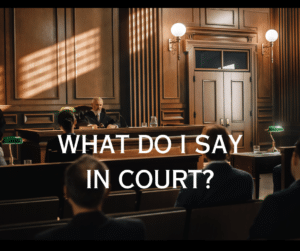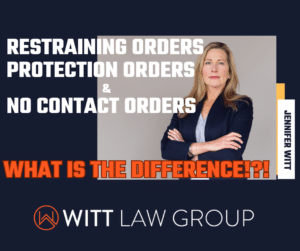
People often call the office and ask about getting a “No Contact” Order against their obnoxious neighbor. While there is an order that can assist in this situation, it is not technically a No Contact Order. There are four types of orders, all different, and people incorrectly lump them all into No Contact Order. If you are going the Court to request an order, this article will assist you in deciding what type of order that you are asking for.
Order of Protection
This is a civil order for people who are a victim of domestic violence or are in fear of violence. It can be tailored to individual needs, but typically it functions to:
1. Prohibit contact of any kind
2. Remove the abuser from the shared residence
3. Give temporary custody of children
4. Order abuser into treatment
There is no cost and it can be granted by a district, municipal or superior court. If it is violated by the abuser there is mandatory arrest.
Restraining Order
This is a civil order for married persons or persons with a child in common who are filing for divorce, legal separation, custody or to determine parentage. To qualify, the person asking for the order does not need to have experienced assault or threats of violence. It also can be tailored to individual needs, but typically it functions to:
1. Prohibit contact of any kind
2. Remove the abuser from the shared residence
3. Give temporary custody of children
4. Order abuser into treatment
5. Order child support
6. Order maintenance income
7. Assign property to the parties
8. Establish permanent child custody or use of the family home
There is a filing fee of $110 and they are obtained in superior court as a part of a family law action. If it is violated, the violator may be arrested and possible criminal or contempt charges may follow.
Antiharassment Order
This is a civil order for persons who are seriously alarmed, annoyed, or harassed by conduct which serves no legitimate or lawful purpose. No relationship between the parties is necessary. This type of order functions to:
1. Prohibit harassment or contact of any kind
2. Restrain the individual from coming within a specific distance from the petitioner’s workplace, school or residence
These may be obtained in superior court ($110.00) or in district court ($41) but these costs may vary. If the order is violated, the violator may be arrested and possible contempt or criminal charges may follow.
No Contact Order
This is a criminal order that is put in place when a criminal case is pending, and will often be issued again at sentencing. No relationship between the parties is necessary. This type of order functions to:
1. Prohibit contact of any kind while a case is pending, and also prohibit contact of any kind after sentencing.
To obtain such an order, a victim must report a crime to the police which in-turn begins criminal charges. The no contact order is issued along with the court’s conditions of release over a defendant.
These orders come from what ever court is prosecuting the underlying crime, it can be a district, municipal or superior court. If the order is violated, the defendant shall be arrested and the issuing court may also modify the defendant’s conditions of release. The orders have no cost.
Hopefully this analysis of each will help people understand the subtle differences between each order. If you have any questions about these orders, feel free to give our office a call. Witt Law Group is a Kitsap County based criminal defense and DUI defense law firm with offices / attorneys in Bremerton and Gig Harbor Washington.

Get help now
Whether you choose to handle your case alone or engage the Witt Law Group, being informed and prepared is essential. Early involvement of an attorney can significantly impact your chances of a fair recovery, allowing you to focus on healing while we handle negotiations with insurance adjusters to secure fair compensation for your injuries.




